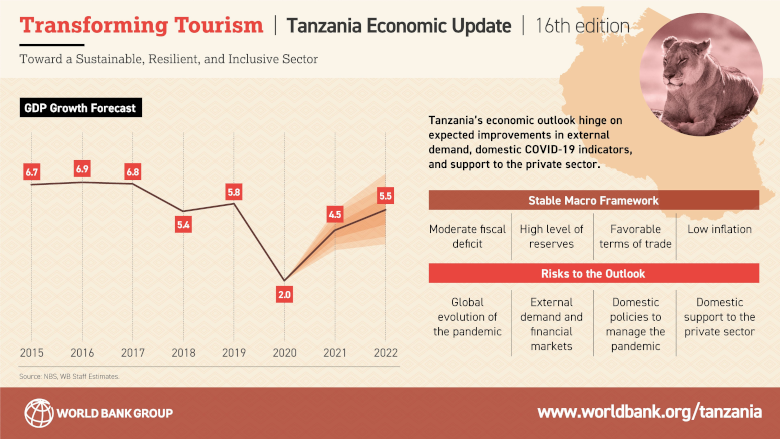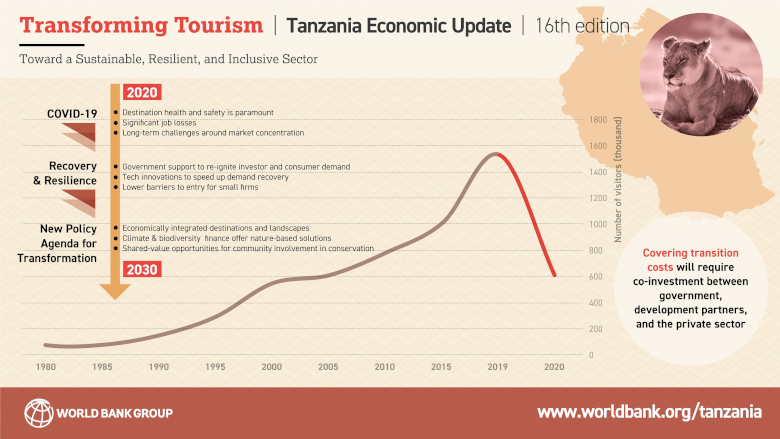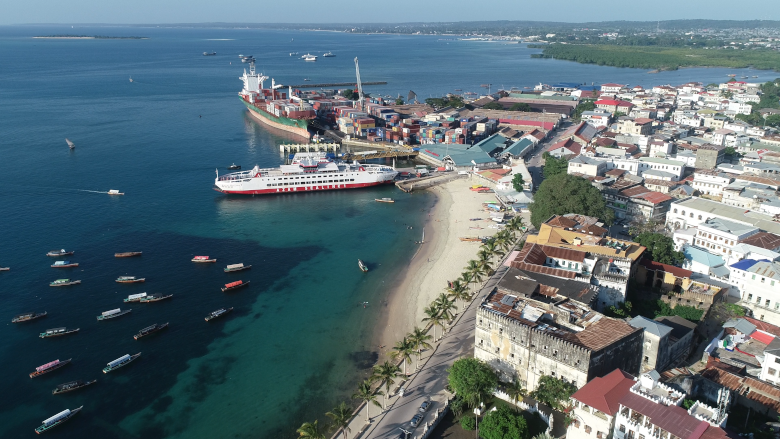TOURISM
offers Tanzania the long-term potential to create good jobs, generate
foreign exchange earnings, provide revenue to support the preservation
and maintenance of natural and cultural heritage, and expand the tax
base to finance development expenditures and poverty-reduction efforts.
Stone Town, Zanzibar. (Photo by Christian Morgan/World Bank).
“Without
tourism, the situation would be bad,” said Rehema Gabriel, a hotel
attendant in Dar es Salaam. “I have been working in the tourism industry
for eight years now, so I do not know what it would be like without
it.”
The
economic system around tourism had grown in value over the years and in
2019 was the largest foreign exchange earner, the second largest
contributor to the gross domestic product (GDP) and the third largest
contributor to employment, the report says.
On
the semi autonomous Zanzibar archipelago, the sector has also
experienced rapid growth, accounting for almost 30% of the island’s GDP
and for an estimated 15,000 direct and 50,000 indirect jobs.
However,
the report notes, only a small fraction of Tanzania’s natural and
cultural endowments has been put to economic use through tourism
development.
“Tourism
offers countries like Tanzania, with abundant natural and cultural
endowments, access to many foreign markets,” said Shaun Mann, World Bank
Senior Private Sector Development Specialist and co-author of the
Tanzania Economic Update.
“But
the absence of tourism revenues, as we have seen during this pandemic,
compromises the integrity and viability of not only endowments, but also
the economic, environmental and social ecosystems built up around those
endowments.”
Amid
the ongoing COVID-19 (coronavirus) pandemic, the World Bank estimates
that Tanzania’s GDP growth decelerated to 2.0% in 2020. Business slowed
across a wide range of sectors and firms, especially export-oriented
sectors such as tourism and manufacturing.
The
report highlights the impact of the crisis on tourism specifically,
which has had consequences beyond just the industry, given the many
other sectors that support, and are supported by, tourism. The 72% drop
in the sector’s revenues in 2020 (from 2019 levels) closed businesses
and caused layoffs.

Zanzibar’s
economy was even more severely impacted with GDP growth slowing to an
estimated 1.3%, driven by a collapse of the tourism industry.
As
the hospitality industry shut down between March and September 2020,
occupancy rates dropped to close to zero. While the Zanzibar tourism
sector started slowly rebounding in the last quarter of 2020, with
tourist inflows in December 2020 reaching almost 80% of those in 2019,
receipts from tourism fell by 38% for the year.
As
the tourism sector transitions gradually into recovery mode with the
rest of the world, the report urges authorities to look toward its
future resilience by addressing long running challenges that could help
position Tanzania on a higher and more inclusive growth trajectory.
Areas
of focus include destination planning and management, product and
market diversification, more inclusive local value chains, an improved
business and investment climate and new business models for investment
that are built on partnership and shared value creation.

Tanzania
is a globally recognized destination for nature-based tourism, a
competitive market segment in eastern and southern Africa.
Beyond
attracting tourists, the country’s landscapes and seascapes produce a
wide range of ecosystem services, including carbon sequestration and
biodiversity co-benefits that are not efficiently priced and often
generate little or no financial return.
The
global climate crisis has created significant demand for investment in
these forms of natural capital, and Tanzania is well positioned to take
advantage of nature-positive investment opportunities.
The
additional revenue derived from global climate programs could be an
opportunity to ease the government’s fiscal constraints while also
supporting the livelihoods of local communities.
“While
restoring the trade and financial flows associated with tourism is an
urgent priority, the disruption of the sector has created an opportunity
to realign tourism development with economic, social, and environmental
resilience,” said Marina Bakanova, World Bank Senior Economist, and
co-author of the report. “The pandemic has created an opportunity to
implement long-discussed structural reforms in the sector and use
tourism as a leading example of improvement of the overall business
climate for private investment.”
The
authors suggest five priorities for a sustainable and inclusive
recovery that lay the foundation for the long-term transformation of the
tourism sector:
>Creating
an efficient, reliable, and transparent business environment to reduce
red tape and multiple distortions and inefficiencies, hindering
decisions on private investments, domestic and foreign
>Establishing
an information-management system that consolidates data from tourists
and firms, enabling policymakers to improve sectoral planning and
identify viable investment opportunities
>Ensuring
that firms across the sector, as well as those in downstream value
chains, have access to affordable transitional finance
>Consistently promoting, monitoring, and reporting on adherence to health and safety protocols.
>Developing
co-investment and partnership arrangements to support nature-based
landscape and seascape management. (Credit; World Bank Tanzania)

 Zanzibar’s
economy was even more severely impacted with GDP growth slowing to an
estimated 1.3%, driven by a collapse of the tourism industry.
Zanzibar’s
economy was even more severely impacted with GDP growth slowing to an
estimated 1.3%, driven by a collapse of the tourism industry.  Tanzania
is a globally recognized destination for nature-based tourism, a
competitive market segment in eastern and southern Africa.
Tanzania
is a globally recognized destination for nature-based tourism, a
competitive market segment in eastern and southern Africa. 






No comments:
Post a Comment